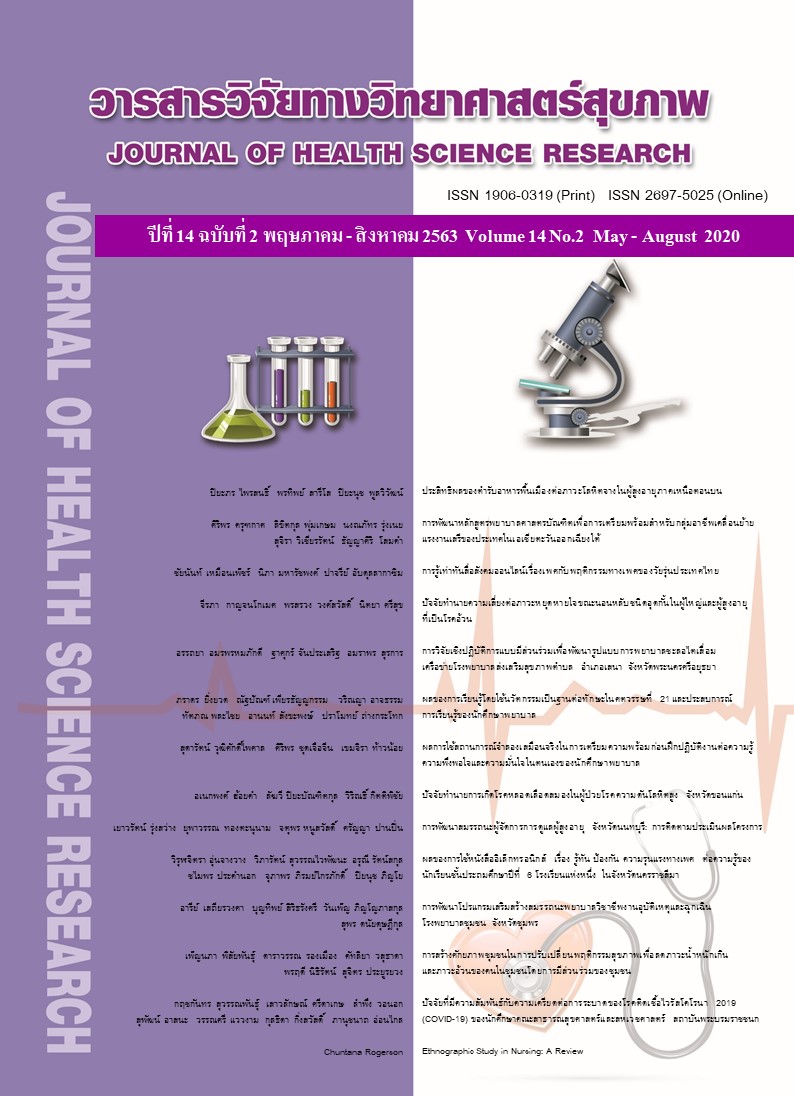ผลของการเรียนรู้โดยใช้นวัตกรรมเป็นฐานต่อทักษะในศตวรรษที่ 21 และประสบการณ์การเรียนรู้ของนักศึกษาพยาบาล
Main Article Content
บทคัดย่อ
บทนำ: การเรียนรู้โดยใช้นวัตกรรมเป็นฐานเป็นการศึกษาที่มุ่งเน้นให้นักศึกษามีประสบการณ์การเรียนรู้ผ่านการลงมือปฏิบัติด้วยตนเอง ซึ่งเป็นกลยุทธ์ที่ส่งเสริมให้เกิดทักษะการเรียนรู้ในศตวรรษที่ 21
วัตถุประสงค์การวิจัย: เพื่อศึกษาผลของการเรียนรู้โดยใช้นวัตกรรมเป็นฐานต่อทักษะการเรียนรู้ในศตวรรษที่ 21 และประสบการณ์เรียนรู้ของนักศึกษาพยาบาล
วิธีการวิจัย: การวิจัยกึ่งทดลองชนิดศึกษาสองกลุ่ม วัดก่อนและหลังการทดลอง กลุ่มตัวอย่างเป็นนักศึกษาพยาบาล แบ่งเป็นกลุ่มทดลอง 38 คน และกลุ่มควบคุม 37 คน เครื่องมือที่ใช้ในการทดลองเป็นรูปแบบการเรียนรู้โดยใช้นวัตกรรมเป็นฐาน จำนวน 8 ครั้ง ครั้งละ 60 นาที รวม 8 สัปดาห์ เครื่องมือที่ใช้ในเก็บข้อมูล ได้แก่ แบบบันทึกข้อมูลทั่วไป แบบประเมินทักษะการเรียนรู้ในศตวรรษที่ 21 และแบบประเมินประสบการณ์การเรียนรู้ของนักศึกษาพยาบาล มีค่าสัมประสิทธิ์แอลฟาของครอนบาค .98 และ .95 ตามลำดับ วิเคราะห์ข้อมูลโดยใช้สถิติไคสแควร์ และสถิติทดสอบค่าที และสถิติทีคู่
ผลการวิจัย: พบว่าค่าเฉลี่ยทักษะการเรียนรู้ในศตวรรษที่ 21 ของกลุ่มทดลองสูงขึ้นกว่าก่อนการทดลองอย่างมีนัยสำคัญทางสถิติ (p<.05) และเมื่อเปรียบเทียบกับกลุ่มควบคุม พบว่า ค่าเฉลี่ยทักษะในศตวรรษที่ 21 สูงกว่ากลุ่มควบคุมอย่างมีนัยสำคัญทางสถิติ (p<.05) กลุ่มทดลองมีประสบการณ์การเรียนรู้จากการจัดการเรียนรู้โดยใช้นวัตกรรมเป็นฐานอยู่ในระดับสูง (= 4.01, SD = 0.01)
สรุปผล: ประสิทธิผลของการเรียนรู้โดยใช้นวัตกรรมเป็นฐาน สามารถส่งเสริมทักษะการเรียนรู้ในศตวรรษที่ 21 และประสบการณ์เรียนรู้ของนักศึกษาพยาบาล ควรนำไปเป็นแนวทางการในจัดการกิจกรรมเสริมหลักสูตร และแนวทางการพัฒนากระบวนการผลิตนวัตกรรมสุขภาพสำหรับนักศึกษาพยาบาล
Downloads
Article Details
บทความที่ได้รับการตีพิมพ์เป็นลิขสิทธิ์ของวิทยาลัยพยาบาลบรมราชชนนี จังหวัดนนทบุรี
ข้อความที่ปรากฏในบทความแต่ละเรื่องในวารสารวิชาการเล่มนี้เป็นความคิดเห็นส่วนตัวของผู้เขียนแต่ละท่านไม่เกี่ยวข้องกับวิทยาลัยพยาบาลบรมราชชนนี จังหวัดนนทบุรี และคณาจารย์ท่านอื่น ในวิทยาลัยฯ แต่อย่างใด ความรับผิดชอบองค์ประกอบทั้งหมดของบทความแต่ละเรื่องเป็นของผู้เขียนแต่ละท่าน หากมีความผิดพลาดใด ๆ ผู้เขียนแต่ละท่านจะรับผิดชอบบทความของตนเองแต่ผู้เดียว
เอกสารอ้างอิง
Cullen L. Evidence Into Practice: Awakening the Innovator in Every Nurse. J Peri Anesth Nurs. 2015;30(5):430-5.
Herzlinger RE, Ramaswamy VK, Schulman KA. Bridging health care’s innovation-education gap. Bright, MA: Harvard Business Publishing; 2014.
Office of the National Economic and Social Development Council. (2019). National Reform Implementation Plan Summary Report 2019. Retrieved 20 May 2020 from http://nscr.nesdb.go.th/wp-content/uploads/2020/04/CR_ForWeb.pdf (in Thai).
Innovation-Based Learning Institute. Innovation-Based Learning. [Internet]. 2018 [cited 2020 May 9]; Available from: http://ibl. institute/.
Gowanit C, Thawesaengskulthai N, Sophatsathit P, Chaiyawat T. Information technology systems of service process innovation. ARPN J Eng Appl Sci. 2015;10 (2):488-98.
Trilling B, Fadel C. 21st century skills: Learning for life in our times. San Francisco, CA: John Wiley & Sons; 2009.
Natthunatiruj R. The Student Affairs Administration of Higeher Education Institute in the 21st Century. Journal of Educational Administration, Silpakorn University. 2019; 10(2):11-23. (in Thai).
Ngamjarus C, Chongsuvivatwong V, McNeil E. n4Studies: Sample Size Calculation for an Epidemiological Study on a Smart Device. Siriraj Medical Journal. 2016;68:160-70. (in Thai).
Lawang W, Junprasert S. Using project-based learning to enhance 21st century skills of master’s students in nursing science program (community nurse practitioner). Journal of Nursing and Education. 2017;10 (2):33-45. (in Thai).
Turner K, Leungratanamart L, Niranrat S, Jarnarerux J, Wattanakull B, Reunreang T. Twenty First Century Skills of Nursing Students of Boromarajonani College of Nursing, Chonburi. Nursing Journal of the Ministry of Public Health. 2015;25(2):178-93. (in Thai).
Kaewtong S, Tiamtipon K. Integration of teaching in Innovation and Education Technology subjects and Health promotion subjects with Project-Based Learning method. Journal of Education and Development Sciences. 2017;1(2):38-46. (in Thai).
Sondee S, Khamsri R, Prapasorn W. Effects of a Nursing Practicum Preparation Program on the Level of 21st Century Skills among Nursing Students. The Southern College Network Journal of Nursing and Public Health. 2020;7(1):281-92. (in Thai)
Muakyod P. 21st Century Learning Activity and Skills for Maejo University Students. J. of Soc Sci & Hum. 2018;44 (1):150-84. (in Thai).
Rueangsawat S, Saetew P, Choome P. The Effect of Blended learning Management on 21st Century Learning Skills For Nursing Students, Boromarajonani College of Nursing, SuratThani. Journal of The Royal Thai Army Nurses. 2020; 21(1):235-44. (in Thai).
Ponguakson P. Learning in The 21st Century: Lesson Learned from Flipped Classroom. Journal of The Royal Thai Army Nurses. 2018;19(2):47-54. (in Thai).
Schwieger D, Ladwig C. Reaching and Retaining the Next Generation: Adapting to the Expectations of Gen Z in the Classroom [Internet]. 2017 [cited 2020 May 9]; Available from: https://files.eric. ed.gov/full text/EJ1179303.pdf.
Sodprasert S. 21st Century Skills: Learning skills to become the professional teacher. Journal of Multidisciplinary in Humanities and Social Sciences. 2018;1(2): 1-12. (in Thai).
Sottipolanun S. Guidelines to Create A Positive Classroom Climate in The 21st Century for Professional Teacher. Phranakhon Rajabhat Research Journal Humanities and Social Sciences. 2018;13(2):373-88. (in Thai).
Yeh L, Assatarakul T. Developing a Transformative Learning Model through Experiential Learning at the Bachelor of Arts Program in Learning Sciences of Thammasat University. PSDS Journal of Development Studies. 2019;2(2):103-39. (in Thai).


